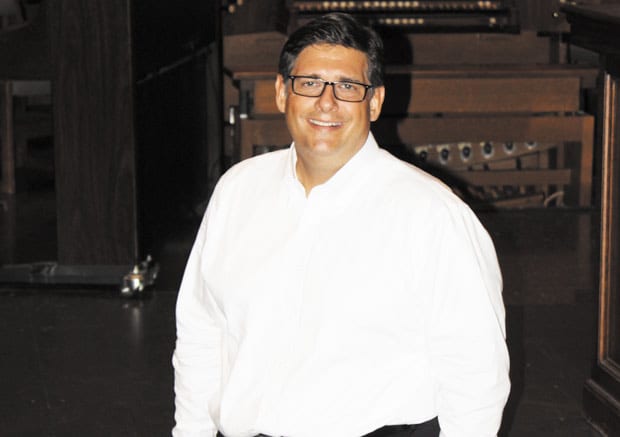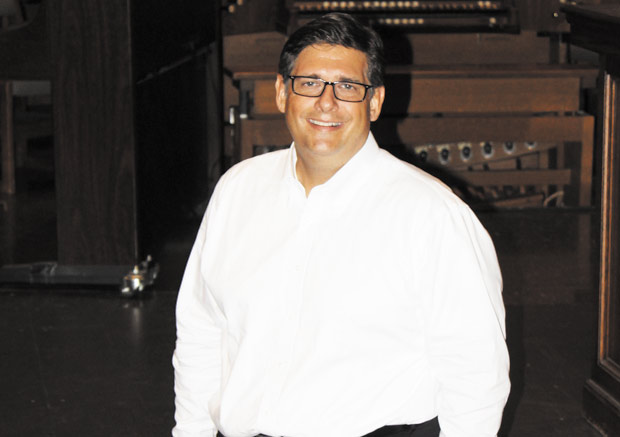First Presbyterian Church is as old as Dallas and steeped in a tradition of compassion
DAVID TAFFET | Senior Staff Writer
Walking from lunch back to his church on Harwood Street, the Rev. Joe Clifford stopped to help a man in a wheelchair who sounded like he was in distress. He was sitting in direct sun on the first hot and humid day after the rain stopped this summer.
The man told Clifford he was waiting for a bus but the last driver didn’t help him board. Clifford told him to wait there and he’d go back to the church and arrange for a DART handi ride.
No, most people wouldn’t stop to help someone on the street. But Clifford is the head pastor of First Presbyterian Church in Dallas. Helping people is what he and his church do.
The church is as old as the city, chartered a day after Dallas received its city charter in 1856. And First Presbyterian has a long history of inclusion and of helping the less fortunate. Examples of that history are seen throughout the church, located downtown.
A clinic for children set up in the basement of the church merged with two similar clinics and became Children’s Hospital. Pictures in the church show children of all races being served at a time that was rarely seen in Dallas.
In 1975, the church started The Stewpot to feed the homeless, something Clifford calls “the defining ministry of the church.” When the Otis Elevator building across Young
Street became available, the church bought it for The Stewpot, and to provide day center services to connect the homeless to other available social services.
One day recently, lunch had already been served, but many people remained to take advantage of the air conditioning as well as a number of other social services offered by
First Presbyterian and others offered in the same building by neighboring First Methodist Church.
Since the Stewpot began 40 years ago, the need has increased, so First Presbyterian recently purchased another neighboring building from Oncor to house expanding services. Clifford hopes to expand an art program that has brought out the creativity in some of the people his church has served and allowed some to earn enough from their art to find housing. His dream is for a floor of the new building to become a gallery for their work.
Before The Bridge, Dallas’ new homeless shelter, opened, the city was clearing out homeless people from under bridges and other public areas. First Presbyterian found itself at odds with city officials on the issue and allowed about 200 people to camp out on part of the church’s downtown property until the new homeless shelter opened.
Clifford describes his congregation as a mixture, ranging from conservatives to some who’ve been served by the Stewpot. And yet, he adds, they all share a sense of compassion.
 History of inclusion
History of inclusionIn 1983, the Northern and Southern Presbyterian churches reunited after a split that occurred during the Civil War. First Presbyterian’s ministers were leaders in the reunification.
So when the issue of accepting LGBT members became a hot issue in the Presbyterian Church, there was no question where First Presbyterian stood. Everyone was welcome.
Clifford says his LGBT members were never looking to go to a gay church. They were just looking to go to church. He said the church hasn’t begun reaching out — it has always reached out.
As an example, he says, during the Turtle Creek Chorale’s first season, the group was looking for places to perform. One of the group’s first performances was at First Presbyterian Church.
Last year, the Presbyterian Church (U.S.A.) changed its policy on marriage by allowing pastors discretion in whether or not to perform same-sex weddings.
“Marriage involves a unique commitment between two people, traditionally a man and a woman, to love and support each other for the rest of their lives,” is part of the new wording that acknowledges tradition, but allows congregations to follow civil law and perform weddings for same-sex couples.
Clifford says he hasn’t performed a same-sex union yet, but has couples he’s talking to about their upcoming weddings after Texas becomes a marriage equality state. His church doesn’t have an official policy yet, but Clifford says he doesn’t want to present the board with an abstract policy and ask them to make a decision that way.
“People don’t change unless they’re in a relationship with people,” he says. So when one of the couples is ready to marry, Clifford won’t present a policy to the board; he’ll present people who have been members of the congregation for decades.
Clifford doesn’t expect much more discussion than when a gay couple wanted their photo, together as a couple, in the member directory. He says the board might have rejected the idea, but they weren’t going to reject a couple who had been active members of the congregation for years.
He says laws may change soon, but things don’t change until hearts change. That’s why he always likes to make issues about people: “Always err on the side of welcome,” he said.
This article appeared in the Dallas Voice print edition June 19, 2015.


